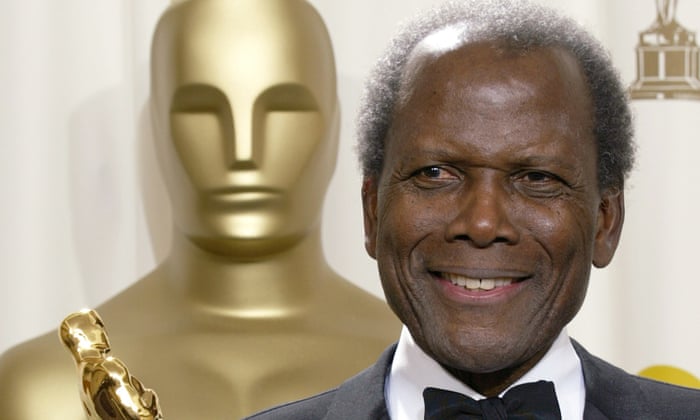Sidney Poitier
Sidney Poitier

Sidney Poitier KBE (February 20, 1927 – January 6, 2022) was a distinguished Bahamian-American actor, film director, and diplomat. He made significant contributions to both the entertainment industry and diplomatic relations between the Bahamas and other nations. Poitier achieved numerous accolades throughout his career, including being the first Black actor and Bahamian to win the Academy Award for Best Actor in 1964.
Born in Miami, Florida, while his family was visiting, Poitier grew up in the Bahamas before moving to Miami at age 15 and later to New York City at age 16. In New York, he joined the American Negro Theatre, where he landed his breakthrough film role as a high school student in "Blackboard Jungle" (1955). Poitier's leading roles in films such as "The Defiant Ones" (1958) and "Lilies of the Field" (1963) propelled him to stardom and earned him critical acclaim, including an Academy Award for Best Actor for the latter.
Throughout his career, Poitier portrayed strong African American male characters in films like "Porgy and Bess" (1959), "A Raisin in the Sun" (1961), and "A Patch of Blue" (1965). He continued to challenge racial stereotypes and address issues of race relations in successful films like "To Sir, with Love," "Guess Who's Coming to Dinner," and "In the Heat of the Night" (all released in 1967), earning him Golden Globe and BAFTA Award nominations.
In addition to his acting career, Poitier directed several films, including "A Warm December" (1973), "Uptown Saturday Night" (1974), and "Stir Crazy" (1980). He received numerous honors, including an honorary knighthood from Queen Elizabeth II in 1974, the Golden Globe Cecil B. DeMille Award in 1982, and the Honorary Academy Award in 2002.
Poitier's contributions to cinema and diplomacy were further recognized with honors such as the Kennedy Center Honor in 1995, the Screen Actors Guild Life Achievement Award in 1999, and the Presidential Medal of Freedom in 2009. He served as the Bahamian Ambassador to Japan from 1997 to 2007, contributing to diplomatic relations between the two countries.

Sidney Poitier, born on February 20, 1927, in Miami, Florida, was the youngest of seven children born to Evelyn and Reginald James Poitier, who were Afro-Bahamian farmers with a farm on Cat Island. Although his family resided in the Bahamas, Poitier's unexpected premature birth in Miami granted him US citizenship. His parents nursed him to health during their extended stay in Miami before returning to the Bahamas.
The Poitier family's ancestry is traced back to Haiti, with some ancestors likely being among the runaway slaves who established maroon communities in the Bahamas. The Poitier surname itself originated from a planter named Charles Leonard Poitier, who immigrated from Jamaica in the early 1800s.
Poitier spent his formative years on Cat Island until the age of ten, when his family relocated to Nassau. This move exposed him to modern amenities for the first time. At the age of fifteen, Poitier moved to Miami to live with his brother's family but struggled with the racism of the Jim Crow era. Seeking better opportunities, he moved to New York City at sixteen to pursue acting, despite facing initial challenges with reading scripts fluently.
During World War II, Poitier lied about his age and enlisted in the Army at sixteen. He was assigned to a hospital in Northport, New York, where he worked with psychiatric patients. Disillusioned by the treatment of patients, he feigned mental illness to secure a discharge.
After leaving the Army, Poitier continued to pursue acting, landing a role in an American Negro Theatre production after a successful audition. This marked the beginning of his remarkable career in the entertainment industry.

Sidney Poitier's journey in the American Negro Theater initially faced challenges, as he was rejected by audiences due to his tone deafness and inability to sing, which was expected of black actors at the time. Determined to overcome these obstacles, Poitier devoted six months to refining his acting skills and eliminating his Bahamian accent. He modeled his speech pattern after radio personality Norman Brokenshire, eventually developing his legendary speech pattern.
On his second attempt at the theater, Poitier caught the attention of directors and was offered a leading role in the Broadway production of Lysistrata. Despite its short four-day run, this opportunity led to an invitation to understudy for Anna Lucasta. During this time, Poitier befriended Harry Belafonte, another prominent figure in the American Negro Theater.
In 1947, Poitier became a founding member of the Committee for the Negro in the Arts (CNA), an organization dedicated to addressing class and racial exploitation from a left-wing perspective. His involvement in CNA activities, including serving as Vice Chair in the early 1950s, and his friendships with other leftist Black performers like Canada Lee and Paul Robeson, resulted in his blacklisting for a few years. Even individuals associated with Poitier, such as Alfred Palca, the writer and producer of one of his early films, Go Man Go (1954), faced repercussions.
Despite pressure to sign a loyalty oath, particularly in connection with his prospective role in Blackboard Jungle (1955), Poitier never complied, maintaining his integrity and principles amidst the political climate of the time.
By late 1949, Sidney Poitier faced a pivotal decision between pursuing leading roles on stage and accepting an offer to work for Darryl F. Zanuck in the film "No Way Out" (1950). Opting for the latter, Poitier's performance in "No Way Out" as a doctor treating a white bigot, played by Richard Widmark, garnered attention and paved the way for more significant and diverse roles.
In 1951, Poitier traveled to South Africa with fellow African-American actor Canada Lee to star in the film adaptation of "Cry, the Beloved Country." Poitier's prominence continued to rise with his portrayal of Gregory W. Miller, a member of a troublesome high-school class, in "Blackboard Jungle" (1955). However, it was his performance in Martin Ritt's "Edge of the City" (1957) that truly caught the industry's eye, propelling him towards stardom.
Poitier cherished his experience working with director William Wellman on "Good-bye, My Lady" (1956), praising Wellman for his profound humanity and sensitivity, which influenced Poitier's own approach to directing in later years.
In 1958, Poitier starred alongside Tony Curtis in Stanley Kramer's "The Defiant Ones," a critical and commercial success. Their performances earned widespread acclaim, with Poitier becoming the first Black male actor to receive a competitive Academy Award nomination for Best Actor. He won the British Academy Film Award for Best Foreign Actor for his role.
In 1959, Poitier appeared in the first production of "A Raisin in the Sun" on Broadway, alongside Ruby Dee, under the direction of Lloyd Richards. The play, which introduced aspects of Black life to predominantly White Broadway audiences, was hailed as groundbreaking. Poitier's performance earned him a Tony Award nomination for Best Actor. That same year, he starred in the film adaptation of "Porgy and Bess" alongside Dorothy Dandridge, earning a Golden Globe nomination for his performance.:max_bytes(150000):strip_icc():focal(644x254:646x256)/sidney-poitier-oscar-1ab0effa06344421906510293ac8b6dd.jpg)
References
- "NLS Other Writings: Say How, M-P". National Library Service for the Blind and Print Disabled (NLS) | Library of Congress. Retrieved March 21, 2022.
- ^ Kaufman, Dave (April 14, 1964). "Sidney Poitier First Black Ever To Receive 'Best Actor' Oscar". Variety. Archived from the original on July 9, 2021. Retrieved February 20, 2021.
- ^ "Sidney Poitier". Golden Globes. Archived from the original on March 6, 2021. Retrieved February 20, 2021.
- ^ "The 6th annual screen actors guild awards". sagawards.org. Archived from the original on March 7, 2021. Retrieved February 20, 2021.
- ^ "What Was Sidney Poitier's Net Worth Upon His Death at Age 94?". finance.yahoo.com. January 7, 2022.
- ^ "Legendary Actor Sidney Poitier Dead at 94". E! Online. January 7, 2022.
- ^ "Actor, civil rights pioneer, Sidney Poitier dies – DW – 01/07/2022". dw.com.



































